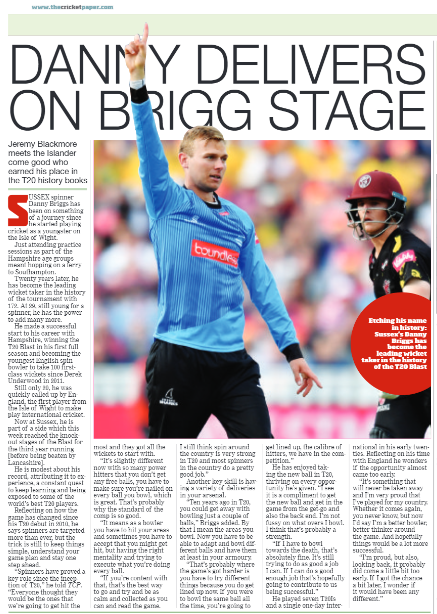
Danny delivers on Brigg stage
Sussex spinner Danny Briggs has been on something of a journey since he started playing cricket as a youngster on the Isle of Wight. Just attending practice sessions as part of the Hampshire age groups meant hopping on a ferry to Southampton.
Twenty years later, he has become the leading wicket taker in the history of the tournament with 172 wickets. At 29, still young for a spinner, he has the power to add many more.
He made a successful start to his career with Hampshire, winning the T20 Blast in his first full season and becoming the youngest English spin bowler to take 100 first-class wickets since Derek Underwood in 2011. Still only 20, he was quickly called up by England, the first player from the Isle of Wight to make play international cricket.
Now at Sussex he is part of a side which this week reached the knockout stages of the Blast for the third year running [before being beaten by Lancashire].
He is modest about his record, attributing it to experience, a constant quest to keep learning and being exposed to some of the world’s best T20 players.
Reflecting on how the game has changed since his T20 debut in 2010, he says spinners are targeted more than ever, but the trick is still to keep things simple, understand your game plan and stay one step ahead.
“Spinners have proved a key role since the inception of T20,” he told TCP. “Everyone thought they would be the ones that we're going to get hit the most and they got all the wickets to start with.
“It's slightly different now with so many power hitters that you don't get any free balls, you have to make sure you're nailed on every ball you bowl, which is great. That's probably why the standard of the comp is so good.
“It means as a bowler you have to hit your areas and sometimes you have to accept that you might get hit, but having the right mentality and trying to execute what you're doing every ball. If you're content with that, that’s the best way to go and try and be as calm and collected as you can and read the game. I still think spin around the country is very strong in T20 and most spinners in the country do a pretty good job.”
Another key skill is having a variety of deliveries in your arsenal.
“Ten years ago in T20, you could get away with bowling just a couple of balls. By that I mean the areas you bowl. Now you have to be able to adapt and bowl different balls and have them at least in your armoury.
“That’s probably where the game’s got harder is you have to try different things because you do get lined up now. If you were to bowl the same ball all the time, you're going to get lined up, the calibre of hitters, we have in the competition.”
He has enjoyed taking the new ball in T20, thriving on every opportunity he is given.
“I see it is a compliment to get the new ball and get in the game from the get-go and also the back end. I'm not fussy on what overs I bowl. I think that's probably a strength.
“If I have to bowl towards the death, that’s absolutely fine. It’s still trying to do as good a job I can. If I can do a good enough job that's hopefully going to contribute to us being successful.”
He played seven T20Is and a single one-day international in his early twenties. Reflecting on his time with England he wonders if the opportunity almost came too early.
“It's something that will never be taken away and I'm very proud that I've played for my country. Whether it comes again, you never know, but now I’d say I'm a better bowler, better thinker around the game. And hopefully things would be a lot more successful.
“I'm proud, but also, looking back, it probably did come a little bit too early. If I got the chance a bit later, I wonder if it would have been any different.”
He looks back with fondness at his time growing up playing at Ventnor Cricket Club.
“They were a great support to get me into the game. I got the access to then go and play for Hampshire from the age of 10.
“So, I was constantly on ferries going to and from. We did a lot of travelling, but that was my passion, and I got enough support to be able to do that and get through to an age where you then get a contract at 18.
“It’s a dream come true, really. It’s just the hours of travel and commitment and training. But hopefully it all pays off when you have a decent enough career.”
Post a comment